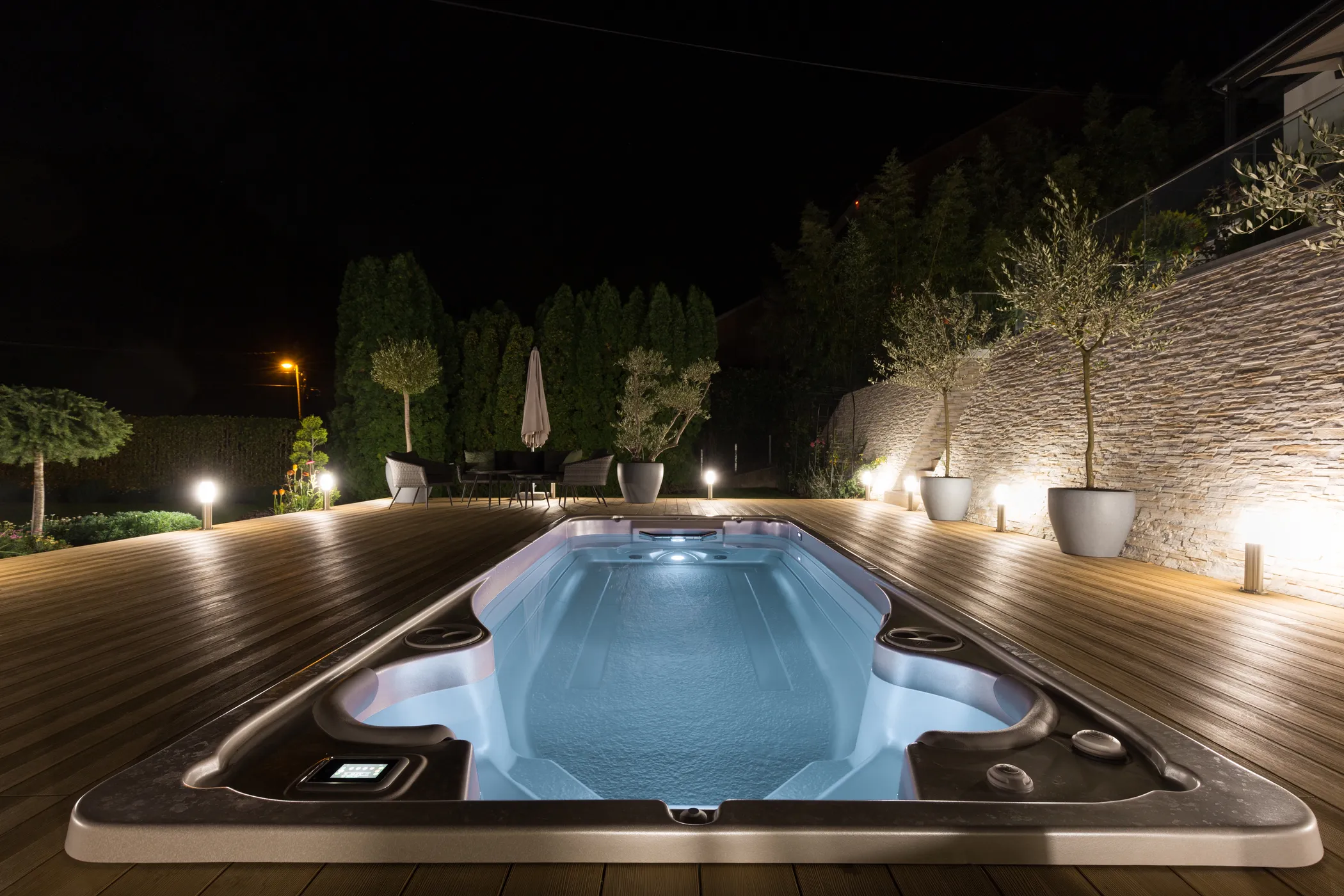Swim Spa Reliability: Your Guide to Common Issues

If you’re looking at buying a swim spa, you’re smart to anticipate that there may be an issue or two in your future that you have to deal with beyond regular maintenance.
That’s why we wrote this article. When people come into our stores, they ask us variations of “what can go wrong?” trying to anticipate and prepare for future issues. It’s entirely fair. If you adopt a dog, you need to know long-term what you’re in for. If you buy a car, you need to know to check the brakes every once in a while. It’s similar when buying a swim spa.
So we talked to our maintenance team and our salespeople to see what issues people do run into with swim spas. And we wrote this piece so everyone would understand what are the most common things you have to deal with down the road once you’re a swim spa owner, so you can have a good sense of how reliable swim spas are.
Spas from decent swim spa brands in general are reliable. They will have good build quality and reasonable running costs. But like anything with moving parts, they will wear out or break down over time.
In this article we will go through every issue we can think of and talk about what the most common ones are. In the end, we actually hope it gives you peace of mind that everything is fixable, as you go over the pros and cons of buying a swim spa.
What Are the Parts of a Swim Spa That Can Have Problems?
Pumps: Swim spas come with two to three (or more) pumps that power your jets and circulation. More pumps is not always better: If you get more than what you need you’re just asking for more things to fail and getting power you may not ever even use. What you need is enough pumps to make the swim spa do what you want and run efficiently. Pumps do a lot of work, with leaking as their most common issue over time, as seals can eventually fail.
Heater: The heater warms your swim spa water. It achieves this by having water forced through an element that is heated by electricity. It doesn’t wear out that often, unless your water is out of balance. If it is, then your water will either eat away at it if it is acidic or place mineral deposits on it if it’s basic. Both are bad.
Filters: Ask any swim spa service person: They have seen some scary-looking filters. Rinse it once a week or every 10 days and give it a good soak every quarter or so. Replace once it’s dirty all the way through (usually about once a year). A filter’s job is to get dirty: It’s good if it is getting that way. But run your swim spa with a dirty filter and soon enough it’s clogged and not doing anything for you but causing your machine parts to work harder and destroying your water’s balance … which further destroys your machine-oriented parts like your heater and pumps.
Water: So much begins and ends with keeping your water in balance. Water that's too acidic eats your parts, while with water that’s too basic, you can expect calcium build up. You can fix both, but it increases the wear and tear on your machine over time. You don’t want that. Water can also turn green, become foamy, cloudy, smelly and make your skin itchy if not maintained, but here we’re mostly talking about maintenance.
Shell: Swim spas are made of acrylic. It can get scratched, chipped, faded or stained. Calcium build up is another potential issue, again, typically avoided by water balance. Let it go too much and you’re replacing parts sooner than you’ll want to.
Cabinet and frame: Swim spas are heavy. And since they are long, they can be prone to warping and distorting. You don’t want that. Once it happens, there’s little you can do other than replacing components of your frame. To prevent it from happening, you need to make sure your surface is completely flat and will stay that way (this is why every Hydropool swim spa has to be placed on a concrete pad: Not everyone does this, but warping is your biggest risk if you don’t).
Cabinet panels: Can you smash into these and dent or put holes in them? Yes, but you have to smack it harder than you’d think in most cases. It’s possible but rare. Many panels can easily be replaced, assuming your swim spa is still being made in the same style and color.
Electrical: Your electrical powers your panel that runs your swim spa, as well as your pumps and heater and lights. Motherboards and panels can short circuit and fry, just like your computer can, especially if water finds a way to sneak in there. There’s not a lot you can do here to prevent this: a well-built swim spa isolates the electrical from the water as much as possible.
Hoses: These can leak. This is usually an issue early on or many years down the line. Early because it’s possible your spa was jostled during delivery. Down the line it’s because the plumbing lines shake a bit when used, and if not properly supported, they can slowly open up (often the case in perimeter-insulated systems: Hydropool uses full foam in the middle of its swim spas to provide additional support to hoses for this reason).
Jets: Replacement jets are a relatively common purchase over the years as they can get filled up with calcium if your water is unbalanced.
What Can a Swim Spa Owner Do to Avoid Problems?
The one thing anyone can do is maintain good water chemistry in their swim spa. Keeping water balanced and filters checked and cleaned regularly will do more for your swim spa than any other form of maintenance. Many people start with good intentions and then let it go over time and that’s when problems start to creep in. Stay on top of your water and you’ll be better off, we say.
Are Swim Spas Reliable?
We wrote this to explain everything that could go wrong, not that will go wrong!
Just like a car can have issues with its tires, brakes, engine, transmission, electrical, body and glass, swim spas can have problems with pretty much any component they are made of, depending on circumstances.
But like hot tubs, swim spas have proven themselves to be reliable overall, which is why they have become so popular today as pool replacements.
We hope this article has helped you understand how a swim spa works and what issues it may have when it comes to reliability. If we missed something though, please contact us through our local retailer network.






